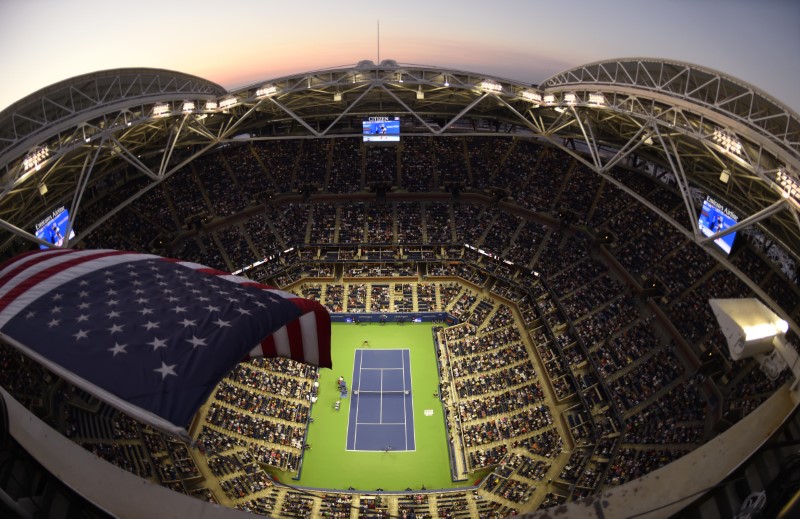By Steve Keating
NEW YORK (Reuters) – When Sloane Stephens and Madison Keys walked onto Arthur Ashe Stadium on Saturday for their U.S. Open final they passed by a small but weighty notice stamped on the court: ‘Arthur Ashe Stadium 20 Years’.
It was not something they would have paid much heed to, if any, but just as it was 20 years ago when Chanda Rubin played the first match on the renamed show court, the significance will manifest itself in years to come.
As racial tensions flare across the United States, the U.S. Open has celebrated its diversity and tolerance on and off the court.
It was 60 years ago that Althea Gibson won her first U.S. Open and 20 since the biggest stage in tennis was renamed to honor Arthur Ashe, the player, humanitarian and activist.
Those efforts to open up the sport were dramatically reflected in this week’s American sweep of all four spots in the women’s semi-finals. Two of those players – Venus Williams and Stephens – are African-Americans and Keys is bi-racial.
“I don’t think there is any other word to describe it than “amazing” for me and Maddie,” said Stephens after beating Venus Williams to reach her first grand slam final.
“Obviously, Venus, we are following in her footsteps. She’s been here. She’s represented the game so well as an African-American woman.
“Maddie and I are here to join her and represent, just as well as Venus has in the past and honored to be here.”
And before the Williams sisters there was Ashe, the winner of three grand slam titles. He was the first black player selected to the United States Davis Cup team and was also awarded the Presidential Medal of Freedom.
The sight of a black man on Wimbledon’s manicured lawns, French Open clay and Australian and U.S. Open hardcourts was once as jarring as it is now routine.
Charismatic African-American Frances Tiafoe ignited a soldout Arthur Ashe stadium 11 days ago as he battled Roger Federer in a first round thriller before surrendering in five sets.
The crowd was roaring again on Saturday when Stephens swept past Keys 6-3 6-0 to claim the final women’s grand slam title of the year.
As an African-American playing the first match on Arthur Ashe, Rubin says she was aware of being part of something bigger than a sporting contest but it was only years later that she came to truly appreciate the significance of the moment.
There was a ceremony that opening night of Aug. 25, 1997, Ashe’s widow Jeanne Moutoussamy-Ashe spoke and Whitney Houston sang.
But what Rubin remembers most about her match was a disappointing 6-4 6-0 loss to Tamarine Tanasugarn. The result still stings.
“I was aware of it but I certainly didn’t have the perspective I have now.” Rubin told Reuters, recalling that evening while standing in the shadow of the massive stadium.
“You are working to get ready for your matches and you are trying to keep as much of a routine as possible.
“When I thought about it afterwards one of the disappointments was that I wasn’t able to play better, I wasn’t really at my best.
“I was at a level that I was able to play in the first match on Ashe but I was disappointed in the result.”
On that same day, Venus Williams made her U.S. Open debut defeating Larisa Neiland in what would be the first of many appearance on the Arthur Ashe arena.
Two decades later the thrill of playing on Ashe has not diminished for Williams, who still tingles every time she steps onto the court.
“There are not a lot of feelings that are as awesome as playing under the lights in this awesome stadium named after an unbelievable human being,” said Williams. “He (Ashe) played during a time where he couldn’t just focus on the tennis.
“I’m very blessed to be able to focus on my game. But he had to fight because of the color of his skin.
“I can’t even imagine the pressure he was under during that time.”
While players such as Venus and Serena Williams, Stephens and Keys provide inspiration for a new generation, Arthur Ashe Stadium also stands as a monument to grace, tolerance and excellence.
“To have this stadium named after Arthur Ashe is not insignificant,” Martin Blackman, the USTA general manager of development, told Reuters. “You think about the legacy of American tennis and you think about Althea Gibson and Arthur Ashe, and I am sure Frances and others are aware of his tennis history.
“I think this sport is becoming more accessible but we always need to have players at the top that kind of show it is possible.”
(Editing by Gene Cherry and Pritha Sarkar)


















